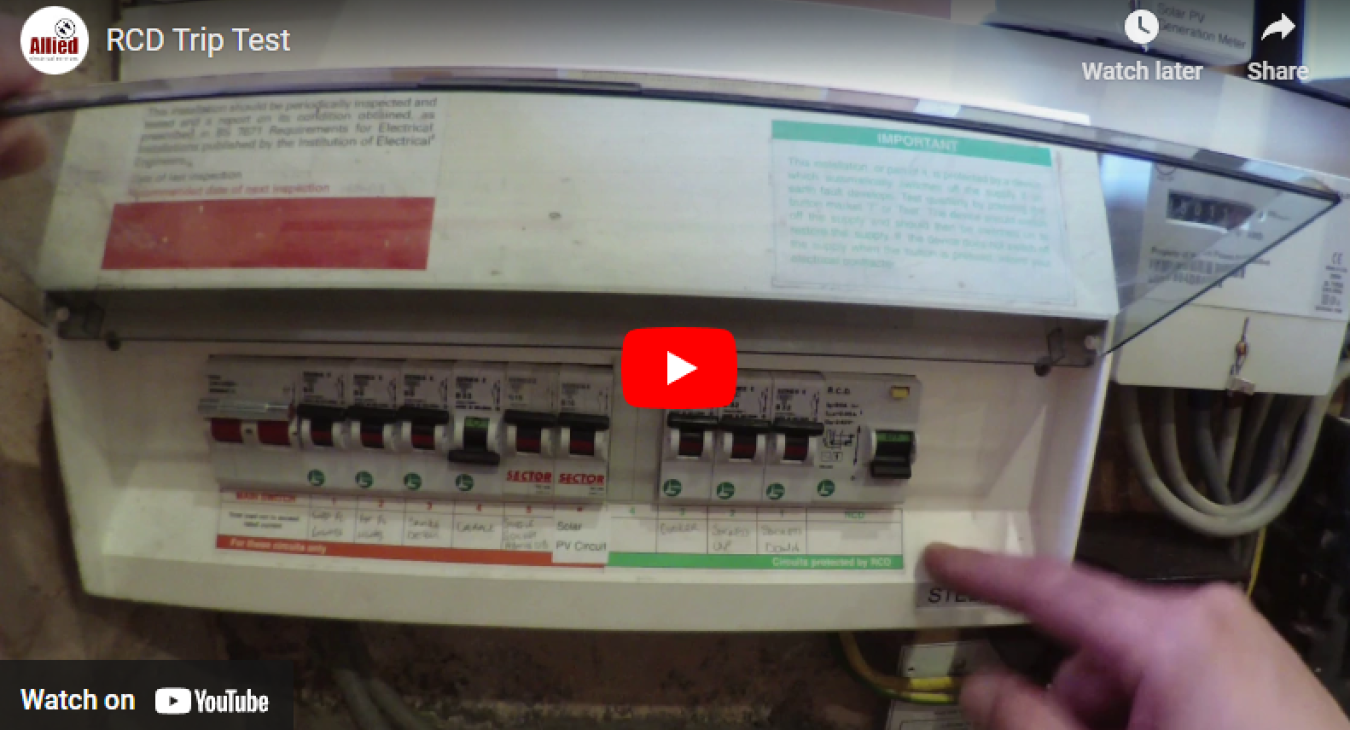
An RCD, or residual current device, is found in your consumer unit (fuse box). It’s designed to protect you from electric shocks. It does this by switching off the electricity automatically in the event of a fault.
Not only does checking your RCD regularly help keep you safe and save you money, but it is one of the easiest electricity checks you can carry out yourself. In our latest blog, we’ll run through RCD’s, how they work and how you can test yours – along with a video tutorial.
How Does An RCD Work?
Your RCD is constantly monitoring circuits for earth leakage faults. If it detects a fault on a circuit it will very quickly switch that circuit off, reducing any risk of injury or electrical fire.
Official research has found that RCD’s are about 97% reliable, but this figure would likely be higher if they were tested more often by homeowners. We recommend testing your RCD once every 6 months:
How To Test Your RCD
As mentioned, testing your RCD is one of the easiest electrical safety checks you can carry out yourself:
- Lift the flap up on your consumer unit.
- Identify the RCD switch – it may be labelled as ‘RCD’ and should have a button marked ‘T’ or ‘Test’ above it.
- Push the test button – this button will check the mechanism operates freely and should cause the RCD to turn the electricity off.
- Switch off the circuit breakers associated with the RCD, reset the RCD and then turn the associated circuit breakers back on.
If the RCD fails to operate or you are feeling unsure about testing it yourself give your friendly, local electrician a call for further information and advice at 0117 303 9000.
Why Does My RCD Keep Tripping?
It can be a nuisance when your RCD trips out, particularly if you are coming home to a half defrosted freezer when you go away. Here are a couple of common causes for excessive RCD tripping and what you can do about them:
- Faulty appliances – This could be anything from your bedside lamp to your washing machine. We suggest that you unplug every appliance, reset the RCD and then plug them back in one at a time checking to see if any cause the RCD to trip out.
- Moisture – Humidity and moisture in electrical wiring will cause your RCD to trip. Seal any leaks in your bathroom or where rain water is getting in to prevent this.
- Outdoor equipment – This can be a moisture issue again, but can also be caused by a faulty pump in your pond or pool – be sure to unplug any outdoor electrical appliances when you go away.
- Older appliances – Older appliances can develop earth faults over time. Items with heating elements can be particularly susceptible.
- Damaged wiring – This could be caused by DIY work. Have any screws or nails been used to hang shelving up recently?
If you are having trouble identifying the cause of your RCD’s continual tripping, it’s always best to call an electrician to inspect it as it could be the RCD itself that is faulty.
Different Types Of RCD and Their Uses
The RCD in the video below was a fixed RCD in a consumer unit or fuse box. These are the most common types of RCD’s and should be present in all modern consumer units. There are two other main types of RCD’s that are designed for other applications:
Socket outlet RCD’s – These are RCD’s designed for 1 power outlet, and can also be found in extension cables. The most common use for these is for outdoor appliances such as lawnmowers and hedge trimmers. If you cut through the wire, the RCD will operate, preventing serious injury to the user.
Portable RCD – These are a temporary solution to socket outlet RCDs. Instead of having a socket fitted with an RCD, this portable RCD simply plugs into any socket. They are a useful safety measure in scenarios where an RCD is not present in the property.
Allied Tip: Portable RCD’s should be tested every time you use them.
What Are The Dangers Of Not Having An RCD?
If you are reading this blog only to discover you don’t have an RCD in your consumer unit, it’s time to update your consumer unit. In the event of a fault, a newer RCD unit will switch the power off within a maximum 0.4 seconds. In an older consumer unit, circuit breakers can take anything up to 5 seconds before cutting off the electric – this is enough time to sustain severe injury and even death.
Contact Your Local, Friendly Electrician
If you are having trouble testing your RCD, fear it may be faulty, or have an outdated consumer unit, we can help. We are trusted, local electricians offering a range of commercial and domestic electrical services for customers in the Bristol area for over 20 years.
To get in touch, give us a call on 0117 303 9000 or fill out a contact form and we’ll get back to you.











